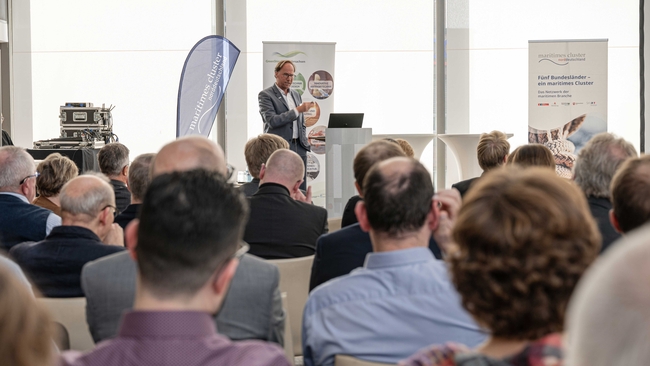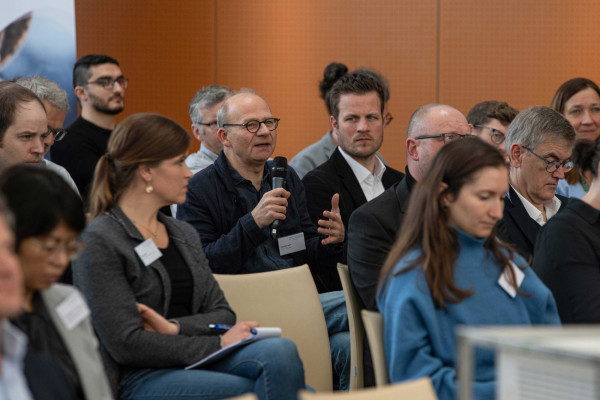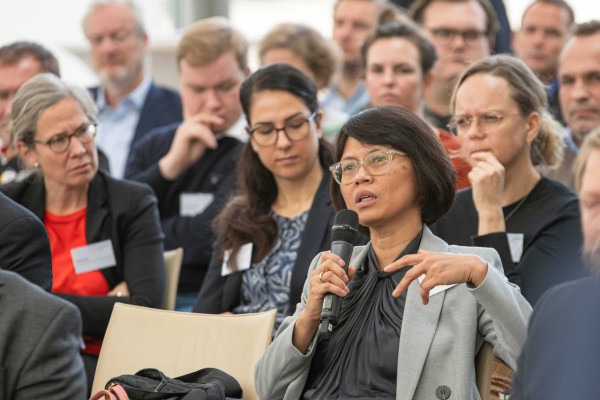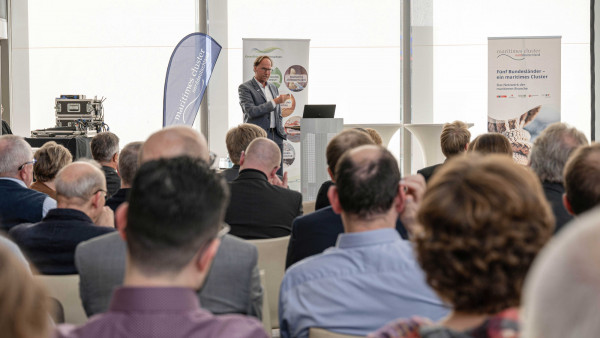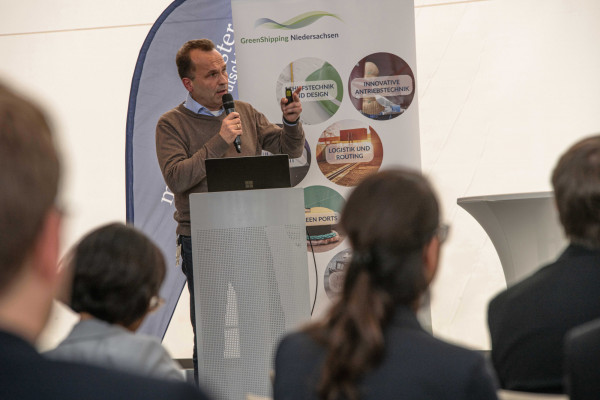10/11/2023 | Opportunities and obstacles for a maritime circular economy were recently highlighted at a symposium organized by the Maritime Cluster Northern Germany. Prof. Dr Raimund Bleischwitz, an expert on circular economy at the Leibniz Centre for Tropical Marine Research (ZMT), presented for the first time a ZMT study on the potential for ship recycling in the state of Bremen at the event, which was prepared under his leadership together with Dr Michael Kriegl (Institutional and Behavioural Economics Working Group) and Jannik Höller (Complexity and Climate Working Group).
For years, hardly any ships were recycled. Now the market is on the move and interest in the recovered raw material is growing in the steel industry. At the symposium "Environmentally friendly ship recycling in Germany - what does it take for a successful market ramp-up?" held in Bremen on November 7, the Maritime Cluster Northern Germany (MCN), in cooperation with the GreenShipping Lower Saxony Competence Center, the German Nautical Association and the Nautical Association of Bremen, addressed the opportunities and tasks still to be solved for the maritime industry.
The figures are impressive. According to the ZMT analysis, more than 20 million tons of steel scrap from the demolition of cargo and passenger ships will come onto the global market every year from 2033. At the same time, the steel industry's demand for the recycling material is growing. Arcelor Mittal's Bremen steelworks alone will require up to 1.75 million tons of scrap per year as a raw material as part of the switch to climate-friendly production processes. "Germany could take on a leading role in the market," emphasized Raimund Bleischwitz at the symposium in Bremen. However, both regulatory and economic obstacles stand in the way of this, as became clear at the symposium with around 90 participants.
Lack of recycling capacity in the industrialized countries of Asia and Europe
When the life cycle of a ship is coming to an end, its owners send it to Bangladesh, India, Pakistan and - somewhat less frequently - Turkey for dismantling. Time and again, images and reports from South Asia about the catastrophic conditions for workers and the environment during "beaching" go around the world. But in the industrialized countries of Asia and Europe, where the ships are built and the owners are based, there is virtually no dismantling capacity. "So far, no one here has put this on the agenda, even though environmentally friendly ship recycling is an important topic for which there is a great deal of expertise in Germany as a maritime location," said symposium moderator Henning Gramann with conviction. Gramann is a certified expert and one of the leading specialists in ship recycling.
Moderator Henning Gramann, zertifizierter Gutachter und einer der führenden Fachleute für Schiffsrecycling. | Foto: Wolfgang Heumer, MCN
Moderator Henning Gramann, certified surveyor and one of the leading experts in ship recycling. | Photo: Wolfgang Heumer, MCN
With the Hong Kong Convention, the first international agreement on minimum requirements for ship recycling will come into force in 2025. "But this is merely a regulation under international law that does not entail any consequences for violations," emphasized Hamburg lawyer and shipping law expert Clemens Hillmer. The EU Ship Recycling Regulation adopted in 2013 is apparently also a blunt sword. According to this regulation, ships sailing under the flag of EU countries may only be scrapped in EU-certified companies - of the 48 companies currently listed in Europe, only very few are occasionally active. Shortly before scrapping, ships are often quickly reflagged so that they do not fall under the EU rule. The background is of a monetary nature: "In South Asia, shipowners receive 450 to 500 dollars per ton of ship weight, whereas in Europe they only receive 100 to 150 dollars," explained Gramann.
Because transport capacities were in high demand and prices for steel scrap were on a downward trend, fewer and fewer ships have been scrapped in recent years. Now a trend reversal is emerging. This is underlined by the potential analysis "Ship recycling in Bremen". "From 2033, around five percent of global scrap demand will come from ship recycling," Bleischwitz reported at the symposium. Due to its existing shipbuilding expertise, the state of Bremen offers excellent conditions for participating in this boom. "Germany could play a leading role in Europe in a strengthened ship recycling sector," the scientist emphasized.
Rising demand for steel scrap
The demand for steel scrap in the steel industry is indeed growing. Bleischwitz is convinced that the industry must drastically reduce its CO2 emissions in production and that increased use of scrap as a raw material could reduce greenhouse gas emissions by 80 to 90 percent. ArcelorMittal's Bremen steelworks is one of the first to gradually replace its two traditionally coke-fired blast furnaces with electric melting furnaces, among other things. Scrap is an important raw material in this process and its carbon content is already low. In Bremen, ArcelorMittal has already set the course in this direction: "In the coming years, we will increase the proportion of scrap from the current 800,000 tons to 1.8 million tons," announced Jürgen Fries, who is responsible for strategy development at the Bremen steelworks.
However, Fries also made it clear at the symposium: "Steel scrap must be of a high quality for our products, for example for the automobile industry." The prerequisites for this must already be created during the scrapping by processing the recovered material as accurately as possible. In addition, many non-ferrous metals and rare materials that are in high demand are used on ships. Both Bleischwitz and Gramann emphasized at the symposium that properly understood recycling places high technological demands on scrapping and is therefore an ideal topic for Germany as a maritime location.
First corporate initiative for ship recycling in Germany
The start-up "Leviathan", winner of the MCN Cup 2021 sustainability award, is the first business initiative for ship recycling in Germany. After a long search, "Leviathan" has found a location in Stralsund where ships up to 140 meters in length are to be recycled as soon as all permits have been obtained. However, before this initiative can become an industry, numerous issues need to be clarified, starting with fundamental questions: Is ship recycling comparable to shipbuilding (only in reverse order) and can it be carried out in existing plants? Or is it a form of waste disposal? Approval procedures, site requirements and operating conditions depend on the classification. "There are still many tasks and unanswered questions ahead of us," said Andreas Born, Head of the MCN office in Bremen, summarizing the symposium. "However, many stakeholders have expressed their interest in participating in demo projects that address the potential of ship recycling and the maritime circular economy as a whole. As the MCN, we will bring the stakeholders together for concrete project initiatives in the follow-up."
Graphic recording of the symposium
Tanja Föhr summarized the content of the presentations and discussions using graphic recording. Take a look at the summaries here:
https://www.maritimes-cluster.de/news/aktuelles/das-grosse-potenzial-fuer-schiffsrecycling-in-deutschland-nutzen/





